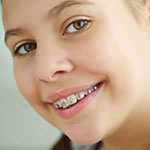
Electric Toothbrush vs. Manual Toothbrush
Toothbrushing is a mainstay of everyday life. Most of us do it twice a day without much of a second thought. As a dental hygienist, I can tell you that most people do not brush as well as they think.
Electric toothbrushes are a common recommendation for people who struggle to get the brushing results their dental hygienist wants to see. However given the cost difference between manual and electric toothbrushes it is common to question whether purchasing an electric toothbrush could really make a difference.
Studies show that electric toothbrushes are generally more effective at reducing plaque and gingivitis than manual toothbrushing. And that is important. It means the brush has undergone rigorous testing and the advertising claims are sound.
To fully appreciate why an electric toothbrush can make a difference, it is important to recognize the advantages to using an electric toothbrush. Here are the three top reasons that people do not get a good result with a manual toothbrush along with ways electric toothbrushes can overcome them.
1. Two Minute Timers
Dental experts recommend brushing for two minutes. You may think that you are, but unless you are timing your brushing there is a good chance you are not brushing for long enough.
With an electric toothbrush you don't have to worry about how long you are brushing for. Most have two minute timers with 30 second pacers to tell you when to change quadrants.
After using one for the first time many patients would come back and tell me that two minutes was much longer than they ever realized.
Good plaque removal takes time, and timers are helpful.
2. Brushing Technique
Some people brush too hard; others not hard enough. If a person also has poor manual dexterity - that can be from age (young or old), disease or disability, it can be difficult to employ a good brushing skills.
With an electric toothbrush, technique is not a factor. The brush head does all the work for you. Some toothbrushes will even monitor the amount of pressure that is used.
3. Focus On Brush Placement
Ideally, the toothbrush bristles should contact the tooth close to the gumline so that the plaque is removed from the tooth surface and from the gingival crevice.
Not getting the plaque removed from the gumline can cause the gum tissue to become swollen, tender, or bleed. This is called gingivitis.
Proper placement of the toothbrush during brushing removes plaque from the gumline and helps prevent gingivitis.
Although with an electric toothbrush there is no magic button that can place the brush in the right position, it simplifies things for you because the brush head does the work and the timer lets you know how long you have been brushing, which allows you to focus on cleaning your teeth right up to the gumline.
If your dentist or dental hygienist has recommended an electric toothbrush it is an investment worth considering. It can simplify your brushing routine and improve your oral health.


